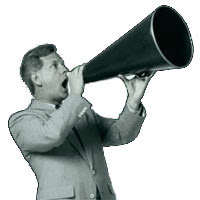Jabber

Jabber is a pejorative term, a put-down. It is often said in contempt, referring to a dialect or a language that the hearer finds unintelligible, or to a message that he or she finds unacceptable. It showed up in print in 1499: “Iangelyn or iaberyn” [jangling or jabbering]. It is probably onomatopoeic, the word rising from an imitation of the perceived sound.
There are similar words, all of them basically defined as,” to speak rapidly and inarticulately; to chatter, talk nonsense.” [OED]
• gibber: [1604, Shakespeare, Hamlet, I. i. 116 (Qo. 2) “The graves stood tenantlesse and the sheeted dead Did squeake and gibber in the Roman streets.”
• jibber: [1824, Scott, Redgauntlet, Lettter. xi “The jackanape . . . jibbered and cried as if it was mocking its master.”]
• gabble: [1577, Stanyhurst, Description of Irelland, i. 4 in Holinshed Chron. I. “He that dooth not perceyue, what is fitting or decent for euerye season, or gabbleth more then he hath commission to doe.”]
• gobbledygook: [1944, American Notes & Queries, Apr. 9/1. “Gobbledygook talk: Maury Maverick's name for the long high-sounding words of Washington's red-tape language.”]
The term jibber-jabber manages to combine two versions to produce industrial-strength onomatopoeia. [1922, A. Haddon, Green Room Gossip ix. 240. “The jibber-jabber was entertaining, not because the utterances were those of ordinary human beings, but because they were the voice of Shaw.”]
The famous version, of course, was jibba-jabba, a hallmark of the A-Team’s Mr. T.
SIDEBAR: sound bite of Mr. T


Comments